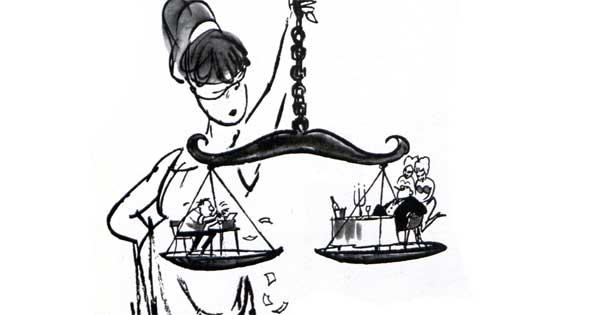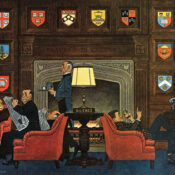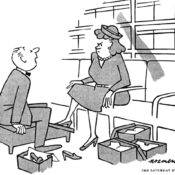The credit card was still in its teen years when this satire was published in The Human Comedy It was a recurring column that appeared in the Post throughout the 1960s and written by well-known and up-and-coming authors like Ogden Nash, Russell Baker, and Thomas Meehan. Below, Pulitzer Prize-winning journalist Jimmy Breslin — known for his streetwise reporting — satirizes the credit card industry:
I Am a Fugitive from the Diners’ Club
By Jimmy Breslin
Originally published on August 14, 1965
It all began some months back when one of my best friends, Fat Thomas, who was then a bookmaker, handled $1,100 in bets from a client who picks very slow horses. Fat Thomas went around to collect and found that his client did not have the $1,100.
“I ought to give you a kick in the ankles,” Fat Thomas said.
“Look,” the customer said. “All I can tell you is that I’m empty. But here, you can use this.” He produced his Diners’ Club card. “Go out and use up $1,100 worth of the card, and we’ll be even.” Fat Thomas brightened. Fat Thomas weighs 495 pounds. Anything to do with dining is Fat Thomas’s game.
But the trouble with a Diners’ Club card is that you can get things other than food with it, and that evening Mr. Fat Thomas was watching a Doris Day movie from a first-class seat of an airliner carrying him to California. Fat Thomas spent a week on the coast. He ate consistently and drank heavily, and threw a big party for himself.
Upon his return to New York, Fat Thomas threw another party for himself at a midtown restaurant. Fat Thomas’s party was the biggest thing to happen in New York in six months. His guest list included Mr. Bad Eddie, Mr. Cheech Vanella, Mr. Pep McGuire, Mr. Albie Silver, Mr. Angelo, some private handicappers, and several other people, including newspaper editors and television announcers. At one A.M. the party sent out for a masseur, who gave rubdowns at the table. At the end of the evening the waiter came with the check and Fat Thomas, pencil in hand, jumped up, signed a huge tip on the check, then bounced between the tables and made his way to the street and home for a week’s rest.
At this point the Diners’ Club personally contacted the real owner of the card. The bill was $3,985 and the Diners’ Club said it would appreciate a slight gesture. This loser looked at the figure and started to faint. Then he pulled himself together and said, “I don’t know nothing about this. I lost my Diners’ Club card a month ago. Somebody stole it off me.”
The Diners’ Club was a bit taken back by this. They happened to mention the matter to a detective from the 16th Precinct in New York City. The detective happened to mention the matter to the waiters in the midtown restaurant. The waiters happened to mention Fat Thomas. Two days later Fat Thomas called me up and happened to mention that he was in the Tombs, which is our local prison.
“Bres, come down and get me,” he said. “And bring a friend.”
“Who?”
“Louis Topper, the bail bondsman.”
The charge was forgery one, which is not a joke. And the judge who had the case is not very funny either. He said something about Fat Thomas and six months in jail. Now I know Fat Thomas all of my life. He dropped out of my class in P.S. 108 to run bets for a bookmaker, and he never stopped. He is a big, delightful bum who never really does anything wrong. He always is broke, and he can’t meet this dinner bill. For a friend, you do things. We got Fat Thomas’s case postponed, and then I went to the offices of the Diners’ Club, No. 10 Columbus Circle, and asked to see Matty Simmons, executive vice president. Matty Simmons knows me for a long time.
“You have a bill of $3,985 that Fat Thomas ran up,” I said. “He is broke. You also have a magazine. It is called the Diners’ Club Magazine. It comes out monthly. If I write stories for it, would you take them as restitution for Fat Thomas’s bill?”
“The editor of our magazine doesn’t like the way you write,” he said. “He thinks Art Buchwald is much better.”
“So my verbs are weak,” I said. “Does that mean a guy has to go to jail?”
That swung Matty Simmons. He drew up a contract which called for me to write for the Diners’ Club Magazine, and for him to give the judge a notice that restitution had been made. According to my contract, I am the featured writer for the magazine for some- thing like the next 86 issues.
When this deal was taken to the courtroom, the judge and Fat Thomas’s probation officer on the case looked it over. They held a conference. Then the judge coughed and said, “This is all right. But this Mr. Breslin, the court is informed, has a very bad name in the writing business. He makes promises to magazines and then never delivers the stories.”
“He took a cash advance from Sports Illustrated, and he never wrote the story,” the probation officer said.
“How do you know that?” I said.
“I have heard,” the probation officer says, “that Time, Inc., has threatened a judgment against you.”
“I saw Clare Boothe Luce at a Goldwater rally, and I told her I was going to make good on the money,” I yelled.
“You also took another advance two years ago from The Saturday Evening Post for a story about Louis Armstrong, and they haven’t seen a line of it yet,” the probation officer said.
“I got writer’s block on Louis Armstrong,” I said.
The judge stepped in. He asked when the first article was due. I gave him the date. He said, all right, sentencing is put off until a week after that date. At that time, the probation officer will report to the court as to the status of the Diners’ Club Magazine article. If it is done, Fat Thomas will not go to jail. He will be free, pending the delivery of the next article.
“What does all this mean?” I ask.
“It means I’m your assignment editor, and the judge is the managing editor,” the probation officer says. “I report to him. If you’re late with your story, Fat Thomas goes to jail. What you better do is forget all these other magazines and concentrate on the Diners’ Club. If I see you in The Saturday Evening Post and not in the Diners’ Club, then Fat Thomas goes to jail.”
Court was dismissed. Fat Thomas went out into the world a free man. I was left as the unpaid feature writer for the Diners’ Club Magazine. And, with a judge and probation officer as my personal editors, I am the most tied-up writer in America.
This past month I told Good Housekeeping I was too busy to do a piece on Barbra Streisand, I told Viking Press I was absolutely overloaded and could not come up with the chapter on a book I owe them, I told Life that I was exhausted and couldn’t write a story on New York politics. And on top of it all, my literary agent called me up the day the Diners’ Club Magazine came out with my first story.
“I have not received my commission from your article,” he said.
“You want a piece of this deal?” I told him. “All right, you got it. You get ten percent of nothing. And if I fall down, you do ten percent of Fat Thomas’s sentence. And be sure to bring a toothbrush. They got no Rexall store at Riker’s Island.”
That night Fat Thomas came over to the house with the magazine in his hand and a worried look on his face.
“Bres,” he said. “Bres, baby. I just read the article. Bres, do me a favor. Write somethin’ better next month. I hear the judge don’t like the way the story reads at all.”
I don’t care. I’m busted out, and I have to take a chance. The milkman is on my back, I owe my tailor $21.75, and my morning mail is full of letters with window envelopes. I have bills all over the place. I’m bootlegging this story because I’m broke. There probably will be a helluva lot of trouble about it in a certain judge’s chambers.
Become a Saturday Evening Post member and enjoy unlimited access. Subscribe now




Comments
Thank you Post Editors for running this still very entertaining feature from Jimmy Breslin. I didn’t know he had a recurring feature in the Post during the ’60s. Perhaps you could run more of them online every now and then.
I also appreciate today’s Post Editors for honoring the issues of the 1960s which at the time were not appreciated the way they should have been, and by extension the editors/publishers either which was unfair. They were/are great, and featured a lot of cool, cutting-edge things LIFE and Look magazine simply didn’t.